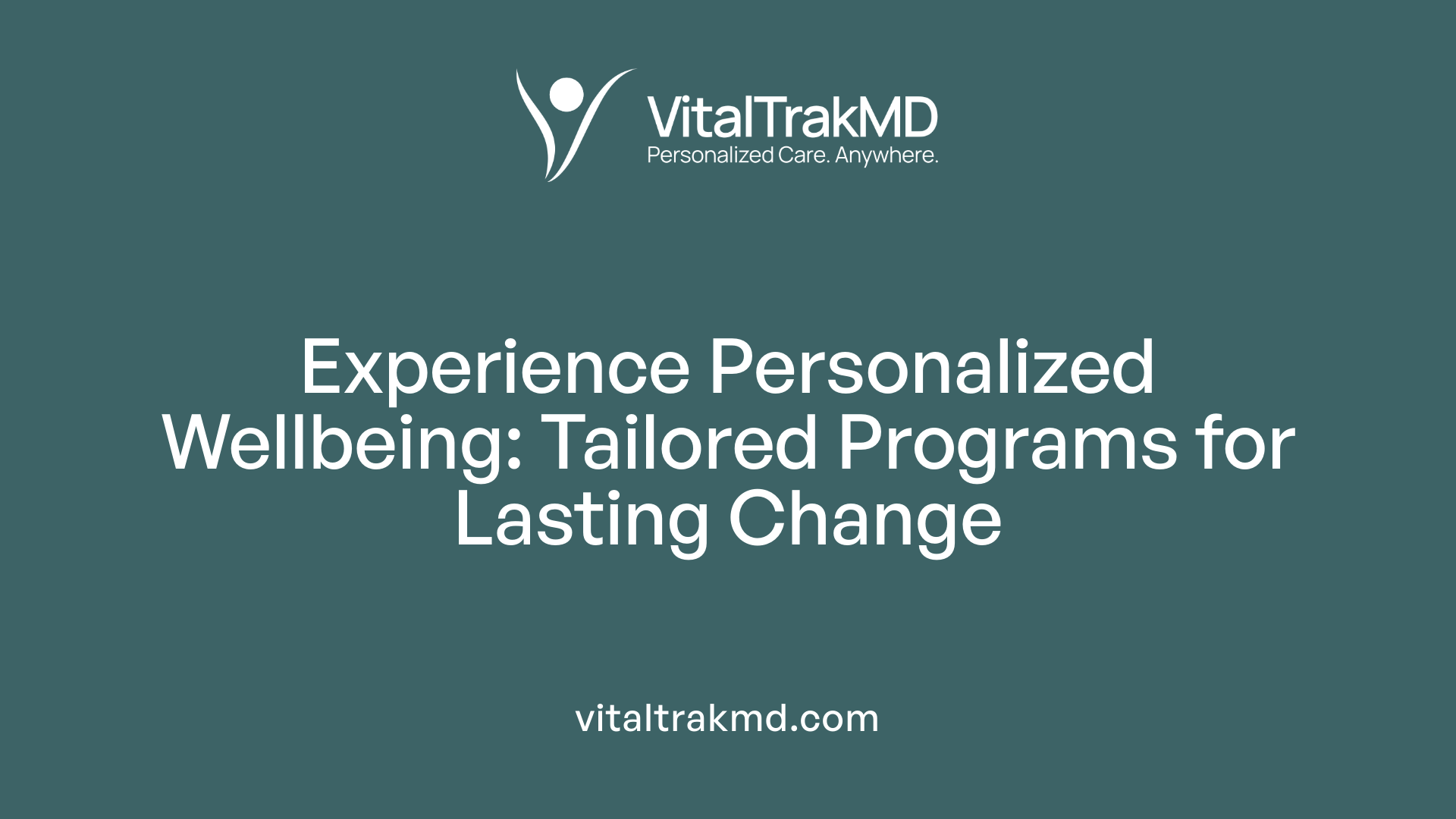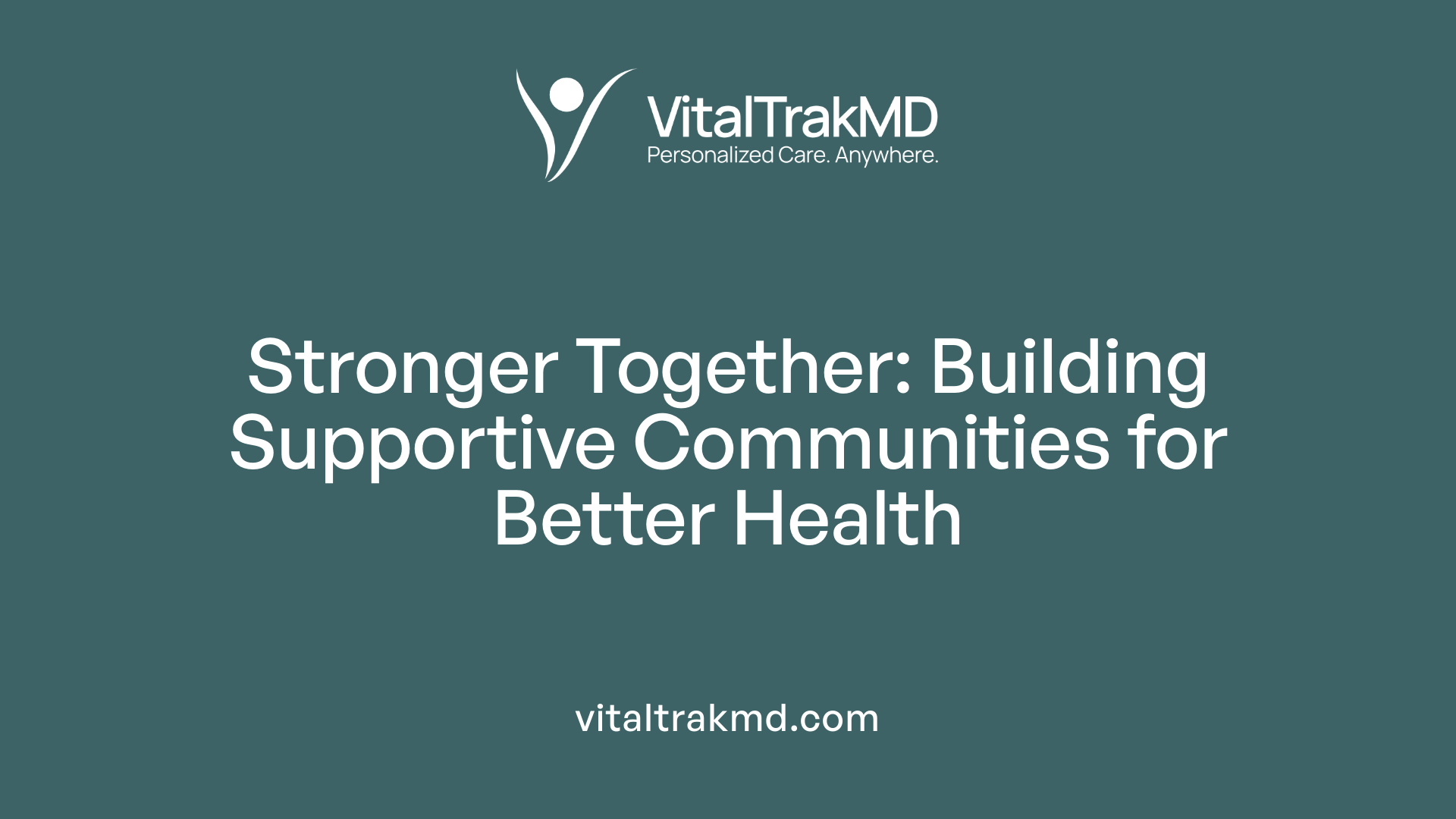Why Hybrid Programs Encourage Better Self-Management of Health

Harnessing the Power of Hybrid Wellness Programs
In the evolving landscape of health and wellness, hybrid programs that combine in-person and virtual sessions are proving essential for better self-management of health. By bridging personalized coaching, flexible technologies, and community support, these programs enable sustainable behavior change, improved chronic disease outcomes, and enhanced mental wellbeing. This article explores why hybrid models outperform purely digital or traditional formats and how they empower participants on their wellness journeys.
Personalized and Comprehensive Care Through Hybrid Programs

How Do Personalized Health Programs Enhance Wellness and Weight Loss?
Personalized health programs, like those offered by Wellvolution, are designed to cater to individual needs across more than 60 specialized options. These range from general well-being to targeted weight loss, chronic condition reversal, and disease prevention. Tailored plans consider personal hunger cues, cravings, and lifestyle factors, enabling members to lose weight sustainably at an average of 3-4 pounds per week. Such customization ensures interventions fit each participant's unique circumstances, boosting engagement and success.
What Comprehensive Supports Are Integrated into These Programs?
Effective programs provide an integrated approach combining coaching, nutrition counseling, and behavioral tools. Wellvolution’s offerings include support from health coaches trained in motivational interviewing, enabling habit formation and behavior modification. Tools may feature digital tracking devices and personalized nutrition guidance. Additionally, components like stress management, sleep optimization, and community support enhance overall wellness, fostering small but impactful lifestyle changes.
How Do Hybrid Models Improve Disease Prevention and Chronic Condition Management?
Hybrid models blend in-person and virtual sessions to maximize accessibility and flexibility. For example, the Why WAIT program delivers multidisciplinary lifestyle interventions over 12 weeks via hybrid formats, yielding significant weight loss and A1C reductions comparable to fully in-person or virtual models. Chronic condition programs incorporate regular coaching from physicians and educators alongside digital monitoring, targeting normalization of biomarkers like blood sugar and blood pressure, reducing medication reliance.
What Are Examples of Evidence-Based Hybrid Programs?
- Why WAIT Program: Combines virtual and in-person delivery, leading to about 8% body weight loss and meaningful cardiovascular risk factor improvements.
- Dr. Dean Ornish’s Heart Disease Reversal: Offers in-person or virtual small group support focusing on diet, fitness, stress, and social connection.
These programs demonstrate that hybrid personalization combined with comprehensive support yields effective prevention and management of chronic diseases and sustainable weight management.
| Aspect | Description | Benefits |
|---|---|---|
| Personalization | Over 60 tailored programs addressing specific health needs | Higher engagement; relevant interventions |
| Comprehensive Support | Coaching, nutrition counseling, behavioral tools | Holistic wellness; supports sustainable lifestyle change |
| Hybrid Delivery | Mix of virtual and in-person sessions | Flexible access; accountability through varied formats |
| Chronic Condition Management | Targeted support including physicians, educators, and digital monitoring | Improved biomarkers; reduced medication dependency |
| Disease Prevention | Focuses on diet, activity, sleep, and stress | Lower risk of diabetes, heart disease |
The Science Behind Hybrid Models: Flexibility Meets Accountability

What is a hybrid delivery combining virtual and in-person sessions?
Hybrid health programs blend the benefits of in-person and virtual sessions, providing participants with both face-to-face interaction and the convenience of remote engagement. For example, the Why WAIT program—a 12-week intensive lifestyle intervention for diabetes and weight management—offers participants a combination of in-person group classes and virtual coaching sessions.
What are the advantages of the hybrid model over purely in-person or online approaches?
The hybrid model delivers multiple benefits:
- Enhanced Accountability: In-person sessions build personal connections and motivation.
- Greater Flexibility: Virtual sessions reduce travel needs and fit better into busy schedules.
- Equally Effective Outcomes: Studies show no significant differences in weight loss or A1C reductions between hybrid, fully virtual, or fully in-person programs.
- Maintained Cardiovascular Benefits: Improvements in blood pressure and lipid profiles remain consistent across delivery methods.
How effective are hybrid programs in diabetes and weight management?
Evidence from the Why WAIT program shows that participants in the hybrid model lost an average of about 8% of their body weight within 12 weeks and reduced A1C by approximately 0.6%. This demonstrates powerful health improvements that support long-term management.
How do care programs support long-term weight loss and wellness?
Care programs promote lasting wellness by offering ongoing personalized coaching, nutritional counseling, and lifestyle tools. They emphasize sustainable habits by addressing cravings, hunger, and physical activity, helping participants maintain results over time. Hybrid modalities fully leverage these strategies by combining structured personal support with flexible digital engagement, empowering individuals to stay committed and improve health outcomes.
Ultimately, hybrid health delivery models represent a scientifically supported approach to chronic disease management and wellness. They successfully marry the accountability of in-person programs with the accessibility of virtual care, providing a new standard for effective, personalized health interventions.
Mental Health Integration: A Pillar of Holistic Wellness
What role does mental health play in wellness and weight loss care programs?
Mental health deeply influences wellness and weight loss success by shaping motivation, lifestyle habits, and emotional resilience. Programs that incorporate mental health care address challenges such as emotional eating and stress-related setbacks, which are common barriers to sustainable behavior change. Featuring professional support like therapy and coaching, these programs help members develop healthier coping mechanisms and maintain lifestyle shifts.
Stress reduction and mindfulness
Stress management is a critical component of wellness programs. Techniques like mindfulness meditation, as offered by platforms such as Headspace and the Unwinding program, build resilience and improve sleep quality. These practices reduce stress-related hormonal impacts on weight and metabolism, fostering a balanced mental state conducive to healthier choices.
Mental health services integrated in health programs
Modern wellness offerings integrate mental health services to support comprehensive care. For example, Teladoc Mental Health provides accessible, 24/7 virtual psychological consultations, enhancing self-management capabilities. Programs like Vida integrate weekly virtual therapy sessions alongside medical and nutrition coaching, addressing anxiety, depression, and stress—common comorbidities in chronic disease and weight management.
These integrated approaches ensure emotional well-being is prioritized alongside physical health, improving long-term outcomes in weight loss and chronic condition management. By combining mental health support with coaching, nutrition counseling, and physical activity, these programs create a sustainable framework for holistic wellness.
Behavioral Coaching: Empowering Sustainable Change
What is the role of health coaching?
Health coaching plays a vital role in helping individuals adopt and maintain healthier lifestyles. It supports sustainable behavior changes by creating a safe, non-judgmental environment where clients can explore their motivations and challenges. Through personalized guidance, health coaching addresses a variety of concerns such as chronic condition management, weight loss, stress reduction, and sleep optimization.
How does motivational interviewing contribute?
Motivational interviewing is a core technique used in health coaching. This client-centered approach encourages individuals to find their own reasons for change, boosting intrinsic motivation. It fosters open dialogue, helping clients overcome ambivalence toward lifestyle adjustments and empowering them to set realistic goals tailored to their unique needs.
What measurable outcomes and skills are emphasized?
Effective health coaching programs include structured processes such as assessments, goal setting, action planning, implementation, and ongoing maintenance. These stages produce measurable health improvements, including reduced blood pressure, better glycemic control, and successful weight management. Skill building focuses on self-management techniques, problem-solving skills, and maintaining long-term adherence to healthier habits.
Why is credentialing and coaching format variety important?
Credentialing, such as certification from the National Board for Health & Wellness Coaching (NBC-HWC), ensures coaches have undergone rigorous training, practical experience, and continuing education. This guarantees high-quality support. Additionally, coaching is offered in multiple formats—in-person, virtual, group sessions, app-based interaction, or text messaging—providing flexibility to accommodate different lifestyles and preferences, making coaching accessible and adaptable for diverse populations.
Technology and Tools Enhancing Engagement and Tracking
How do digital apps and devices integrate into wellness programs?
Digital applications and device integrations play a pivotal role in personalizing and tracking wellness initiatives. Programs like Vida and Eat Right Now incorporate virtual coaching complemented by device data to monitor critical health parameters such as blood sugar, blood pressure, and medication adherence. Mobile tracking apps also enable the collection of real-time biometric data, allowing healthcare providers to tailor interventions effectively and provide timely feedback.
What role do activity trackers and digital scales have in supporting health goals?
Activity trackers and digital scales serve as motivational tools and objective measures of progress in several programs. For instance, the Eat Right Now program uses digital scales and activity trackers to foster accountability and engagement in lifestyle changes. These tools help members monitor their physical activity levels and weight fluctuations, supporting sustainable habit formation and reinforcing personal goals.
How is virtual coaching and educational content delivered?
Virtual coaching is delivered through multiple formats, including live calls, app-based messaging, and virtual group classes. This flexibility ensures access and supports diverse learning preferences. Programs such as Wellvolution offer both in-person and virtual coaching options, combining personal support with educational materials to promote self-management. Educational resources, like those integrated in Blue Shield of California's offerings and the Krames Staywell Health Library, provide easy access to health information, thus empowering informed decision-making.
Which programs utilize personalized health risk assessments?
Personalized health risk assessments are integral to delivering tailored interventions. The RealAge Program immediately provides participants with a detailed health risk report and a corresponding action plan based on their lifestyle factors such as stress, sleep, nutrition, and activity. This personalized feedback enables individuals to focus on specific areas for improvement and track progress effectively.
In summary, the integration of technology — through digital health tools, personalized assessments, virtual coaching, and device tracking — enhances member engagement and supports sustained health improvements across various wellness programs.
Community and Social Support: Vital Components of Hybrid Programs

How do group classes in-person and virtual enhance hybrid health programs?
Hybrid programs combine the benefits of in-person group classes and virtual sessions, creating flexible yet engaging environments for participants. Dr. Dean Ornish's Program for Reversing Heart Disease, for instance, includes nine-week small group classes conducted either in person or virtually. This setting fosters personal support and habit formation, enabling members to connect, share experiences, and motivate each other toward better health.
What role does peer support and social connections play in these programs?
Social connections within hybrid programs act as powerful motivators for sustained lifestyle changes. Programs often provide a community dimension where members receive encouragement from peers and coaches alike. This supportive environment, whether online or face-to-face, helps reduce isolation, enhances adherence to health goals, and builds resilience, particularly vital for managing chronic conditions or adopting new wellness habits.
What are some case studies demonstrating the impact on communities?
Successful implementations, such as the RN Coaching Program, illustrate significant community benefits. These include improved health outcomes, lowered hospitalizations, and substantial cost savings—up to $1.1 million annually per site. These results underscore how integrating community support with hybrid delivery methods amplifies program effectiveness and broadens access to care.
How do these programs support diverse populations including LGBTQ+ and older adults?
Hybrid programs intentionally address specific needs of diverse groups. For example, Teladoc health services emphasize accessible, inclusive care catering to LGBTQ+ populations, while other programs offer tailored coaching and resources for older adults focusing on independence and chronic condition management. This inclusive approach ensures that social and community support is equitable and culturally sensitive, promoting wellness across different demographics.
Future Directions: Expanding Access and Outcomes Through Hybrid Care
How are preventive, management, and reversal programs being combined in hybrid models?
Future health programs are increasingly integrating preventive care, chronic condition management, and disease reversal into comprehensive, hybrid models. These models blend virtual, in-person, and digital coaching to support self-management, lifestyle changes, and medical supervision. For example, Wellvolution and the Why WAIT program combine nutrition counseling, physical activity guidance, and behavioral support to address everything from weight loss to type 2 diabetes reversal. The inclusion of small group sessions, coaching, and community builds sustainable habits that improve long-term health outcomes.
How is integration with healthcare services and telehealth shaping these programs?
Hybrid care maximizes healthcare access by linking lifestyle programs with medical oversight and telehealth consultations. Services like Teladoc provide 24/7 medical and behavioral health access, complementing lifestyle coaching that focuses on nutrition, stress management, and physical activity. Programs such as Virta Diabetes use online medical care combined with biomarker monitoring and personalized nutrition plans, illustrating powerful integration. This seamless connection empowers patients to manage conditions like diabetes, hypertension, and obesity effectively while maintaining consistent communication with healthcare providers.
What impact do these hybrid programs have on healthcare costs and population health?
By reducing hospitalizations, medication dependence, and complication rates, hybrid programs produce both health and economic benefits. Case studies, like the RN Coaching Program, demonstrate savings exceeding $1 million annually per site due to improved chronic disease management. Additionally, population health benefits include sustained weight loss, improved A1C levels, and normalized blood pressure. This integration supports not only individual health improvement but also systemic cost containment and resilience.
What examples illustrate the success of these comprehensive, hybrid approaches?
Dr. Dean Ornish’s Program for Reversing Heart Disease exemplifies a scientifically validated, comprehensive approach that combines nutrition, fitness, stress reduction, and social support, delivering proven reversal of heart disease. Virta Health’s personalized carbohydrate tolerance model similarly reverses type 2 diabetes through nutritional ketosis, supported by online medical care and tracking tools without requiring medications or surgery. Both programs illustrate how blending lifestyle change with medical supervision and flexible delivery modes advances outcomes substantially.
| Aspect | Description | Program Example |
|---|---|---|
| Comprehensive Hybrid Care | Combines prevention, management, and reversal via virtual and in-person support | Why WAIT and Wellvolution |
| Integration with Telehealth | 24/7 access to medical and behavioral health services | Teladoc, Virta Health |
| Cost and Population Impact | Reduces hospitalizations and medication use, saves significant healthcare dollars | RN Coaching Program |
| Science-Backed Reversal | Proven nutrition and lifestyle therapies reversing chronic diseases | Dr. Dean Ornish, Virta Diabetes |
Why Hybrid Programs Are The Key To Sustainable Health Self-Management
Hybrid programs represent the future of effective health self-management by merging the strengths of in-person engagement with the flexibility of virtual delivery. This integrated approach ensures personalized, sustainable lifestyle changes supported by proven coaching techniques, mental health care, and cutting-edge digital tools. By addressing physical, behavioral, and emotional health holistically, hybrid models empower participants to achieve long-lasting wellness and better handle chronic conditions. Their demonstrated success in diverse populations underscores their transformative potential in modern healthcare, making them the preferred pathway for anyone seeking enduring health improvements.
References
- Wellvolution health and lifestyle programs
- Hybrid model of intensive lifestyle intervention is potentially ...
- Wellness Programs | UC - Health Net
- Health Coaching Services: 7 Powerful Benefits in 2025
- No-Cost Member Health & Wellness Programs | California
- Our programs
- Browse Programs
- Choosing a Safe & Successful Weight-loss Program - NIDDK
- Intensive Behavioral Therapy for Obesity
Recent articles
Want to Feel Better and Live Healthier?
Join hundreds of patients taking control of their health with personalized care that fits their life – not the other way around.
Rated 4.8/5 by 32+ customers







